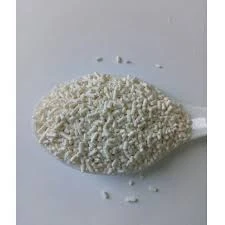
kcl fertilizer
Understanding KCl Fertilizer Importance and Benefits
Potassium chloride, commonly referred to as KCl, is a widely used fertilizer in agriculture, recognized for its essential role in plant nutrition. As one of the primary sources of potassium, it plays a critical role in crop management and soil fertility, making it a staple for farmers around the globe.
Understanding KCl Fertilizer Importance and Benefits
KCl fertilizer is particularly valued for its high solubility and efficiency in nutrient delivery. It typically contains about 60% potassium oxide (K2O), made up of potassium and chlorine ions. The chlorine in KCl, while often considered a negative aspect due to its potential toxicity in high concentrations, is also beneficial for certain crops, particularly in saline conditions, where it can aid in osmotic balance.
kcl fertilizer

One of the significant advantages of KCl is its versatility in use across various crops and soil types. It can apply to cereals, vegetables, fruits, and even ornamental plants. Moreover, it is suitable for different application methods, including broadcasting, banding, and fertigation—where fertilizers are dissolved in irrigation water. This flexibility allows farmers to optimize their nutrient management strategies based on specific crop requirements and environmental conditions.
Furthermore, KCl is often more cost-effective compared to other potassium fertilizers. The production process of KCl is relatively efficient, derived mainly from naturally occurring potassium salts, making it readily available in many regions. Its broad availability ensures that farmers can access it without significant logistical challenges, further supporting agricultural productivity.
However, it's essential to apply KCl wisely. Over-application can lead to nutrient imbalances in the soil and potential environmental harm. Excess potassium can interfere with the uptake of other essential nutrients, such as calcium and magnesium. Thus, conducting soil tests before application is crucial for determining the appropriate potassium needs of the crops and preventing possible adverse effects.
In conclusion, KCl fertilizer is an indispensable tool in modern agriculture. Its contribution to plant health, nutrient efficiency, and overall crop yield underscores its importance in sustainable farming practices. By understanding the proper use and benefits of KCl, farmers can significantly enhance their crop production while maintaining soil health. As global food demands continue to rise, optimizing the use of fertilizers like KCl will be vital in ensuring food security for the future.
-
Understanding Synthetic Rubber OptionsNewsApr.27,2025
-
Trichloroisocyanuric Acid: Essential for Clean and Safe WaterNewsApr.27,2025
-
Sodium Dichloroisocyanurate: Key to Safe Water TreatmentNewsApr.27,2025
-
Sodium Acid Pyrophosphate: Essential in Modern Food ProcessingNewsApr.27,2025
-
Essential Water Treatment ChemicalsNewsApr.27,2025
-
Denatured Alcohol and Its Industrial UsesNewsApr.27,2025
-
The Versatile Uses of Sodium BicarbonateNewsApr.24,2025
Hebei Tenger Chemical Technology Co., Ltd. focuses on the chemical industry and is committed to the export service of chemical raw materials.
-

view more DiethanolisopropanolamineIn the ever-growing field of chemical solutions, diethanolisopropanolamine (DEIPA) stands out as a versatile and important compound. Due to its unique chemical structure and properties, DEIPA is of interest to various industries including construction, personal care, and agriculture. -

view more TriisopropanolamineTriisopropanolamine (TIPA) alkanol amine substance, is a kind of alcohol amine compound with amino and alcohol hydroxyl, and because of its molecules contains both amino and hydroxyl. -

view more Tetramethyl Thiuram DisulfideTetramethyl thiuram disulfide, also known as TMTD, is a white to light-yellow powder with a distinct sulfur-like odor. It is soluble in organic solvents such as benzene, acetone, and ethyl acetate, making it highly versatile for use in different formulations. TMTD is known for its excellent vulcanization acceleration properties, which makes it a key ingredient in the production of rubber products. Additionally, it acts as an effective fungicide and bactericide, making it valuable in agricultural applications. Its high purity and stability ensure consistent performance, making it a preferred choice for manufacturers across various industries.











